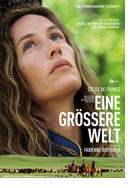

Opening 9 Jul 2020
Directed by:
Fabienne Berthaud
Writing credits:
Claire Barré, Fabienne Berthaud, Corine Sombrun
Principal actors:
Cécile de France, Narantsetseg Dash, Tserendarizav Dashnyam, Ludivine Sagnier, Arieh Worthalter
Corine (Cécile de France) is mourning Paul, the love of her life, who died of cancer. Hoping to transcend her grief, Corine leaves Paris and travels to the north of Mongolia to record material for a documentary on ritual ceremonies. With the help of her translator Naraa (Narantsetseg Dash), she is introduced to the Tsaatans, reindeer herders of the Mongolian steppe and attends a shamanic ceremony. During the ceremony, the sound of the drum used by the shaman Oyun (Tserendarizav Dashnyam) plunges Corine into a long agitated trance that she cannot control. Oyun tells Corine that her altered state of consciousness, where she imitates the cries of a wolf, is a sign that she is a shaman herself. Should she not be initiated into the shamanic tradition the spirits would be irritated and take revenge. Despite the opposition of her sister Louise (Ludivine Sagnier), Corine agrees to go back to Mongolia and start the journey of her initiation to shamanism. But how far will Corine go to fulfill the promise that she and Paul would see each other again? The story brings together interesting questions about the invisible, the trance, and the link between brain activity and spirituality.
Director Fabienne Berthaud takes on the challenging task to dramatize the real-life story of Corine Sombrun (“My Initiation with the Shamans”), brilliantly interpreted by Cécile de France (“L’Auberge Espagnole” aka “Pot Luck”) who embodies the character with delicacy and authenticity. The film, half-way between drama and documentary, is uneven and, at times, runs a bit too long. However, it reveals the superb camera-work of Nathalie Durand, director of photography, showcasing the natural beauties of the Mongolian forest-steppe, an inaccessible region where there is no electricity or running water, and where everyone believes in spirits. The acoustic vibrations of the shamanic drums, the animals’ breathing, and their hooves on the earth fully contribute to the spectator’s experience of the invisible world. If one is not receptive and open-minded to ancestral traditions calling on spirits, the trance scenes may cause surprise or even annoyance. It is then difficult to take this initiatory journey seriously, despite the commitment of Cécile de France and the mystery of the Mongolian forests. But the viewer is likely to be touched to the heart by the sweetness of the glance cast on this true story. (Brigitte Bernard-Rau)
The opening sequence sets the tone and pace of this beautifully executed interpretation of Corine Sombrun’s novel, Mon initiation chez les Chamanes, with an adaptation by director Fabienne Berthaud, and Claire Barré. Aware that in most cultures worldwide a shaman is as uncommon as seeing a cow fly, Berthaud astutely chose to let the phenomenal Belgian actress Cécile de France, together with Nathalie Durand’s cinematography lead, thus ensuring this film’s specialness.
Following a devastating personal loss, Corine accepts the job to record sound for a documentary filming in Mongolia. Traveling via mini-van crossing the steppes of North Mongolia, and then on horseback, the breathtaking landscapes she sees beckon to wild freedom. At the Dukha encampment, her interpreter Naara (Narantsetseg Dash) guides Corine as she meets Oyun (Tserendarizav Dashnyam), and other members of the nomadic reindeer herding community. While recording Oyun’s shamanic session, Corine is strongly affected, shaken, yet rejects the spiritualist’s explanation. Nevertheless, hearing the recordings from the safety of a Paris recording studio, Corine finds an excellent reason to revisit Mongolia, and in particular shaman Oyun.
Surely challenging, compositor Morgan Hardy’s visual effects balance the real world’s vibrancy—particularly in Mongolia, with the lure of the spiritual world by manipulating B/W footage to depict Corine’s trance states. The cast physicality amalgamation of personable nomads and Europeans, is exotic, engaging and attention-grabbing. In Eine Grössere Welt, its naturalness defies our disbelieving shamanic influence and, if anything, is a bittersweet reminder of what many Westerners have lost sight of. (Marinell Haegelin)